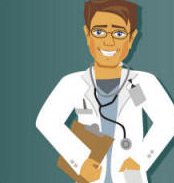
Ulcerative Colitis - Kids & Teens
Treatment plan for
Ulcerative Colitis
Surgery
Mild disease is more often than not treated with appropriate
medications - surgery is usually reserved for more severe cases, or
if complications arise. If you are not needing to have surgery, don't worry about the following sections talking about the different
types of surgery, meeting with the surgeon, and the questionnaire.
Will I need surgery?
For most people
with ulcerative colitis, medicine is used first. However, for people
with more serious problems or in people who do not do well with
medicine, surgery may be an option.
About 25%-40% of
people with ulcerative colitis will benefit from surgery at some
point in their lives. The main benefit of surgery is that once the
colon and/or rectum are removed, patients with ulcerative colitis
are considered to the 'cured' as the diseased tissue is completely
removed. As a result, there is no need for maintenance medication.
There are two
different types of surgery for ulcerative colitis. Your doctor will
tell you which surgery is best for you based on your age, health and
your illness. These two types of surgery are described below.
What are the common types of surgery for ulcerative colitis?
Proctocolectomy with ileostomy:
This surgery has been done for many years. The surgeon takes out the
colon, rectum and anus. Then, an ileostomy is done, in which the
lowest part of the small intestine (called the ileum) is put through
a small hole (known as a stoma) in the belly wall. This allows waste
to be drained from the body. A waste collection bag is worn over the
opening (called an ostomy) to collect the waste.
Restorative proctocolectomy
(also called an ileoanal pouch anal anastomasis or IPAA): This is a
much newer surgery that is done in two steps. In the first step, the
colon is removed, and care is taken to keep both the anus and anal
muscles (referred to as anal sphincters) in place. In the second
step, the ileum (end of the small intestine) is turned into a pouch
and connected to the anus after removal of the rectum. In some
cases, to allow the pouch to heal after surgery, an ileostomy (as
described above) is created, and closed 10-12 weeks later. The
internal pouch is used to collect waste. Poo can then pass through
the anus normally.
Meeting with the surgeon
Deciding to have
surgery can be very difficult. If you are feeling scared or worried
about having surgery, it may help to know what will happen, both
before and afterwards. Sometimes it is helpful to meet other people
who have already had the same surgery because they can tell you
about it. When you visit the surgeon, you can ask any questions you
may have. In this meeting, you will have a chance to meet the
surgeon and talk about what will happen and what you should do to
get ready.
Some people fear
surgery so much that they put if off for years or even tell their
doctor they are feeling well when they really aren't. This can lead
to more needless pain and could stop you from getting in control of
your ulcerative colitis more quickly. Surgery can give relief from
symptoms and may even help you stop taking your daily medicine.
Also, surgery may be your best chance of getting better and help get
you back to doing the things you did before you got sick.
To help you get ready for your visit with the surgeon, you may want
to prepare a list of questions you want to ask him or her. The next
activity will help you do that.
Questions to ask
your surgeon - parent-child activity
 Here
are a few example questions that you may want to ask your surgeon
when you have your visit. Click on the
PDF icon to open and
print the list. Then, at the end of the list, add in any other
questions you want to ask. Here
are a few example questions that you may want to ask your surgeon
when you have your visit. Click on the
PDF icon to open and
print the list. Then, at the end of the list, add in any other
questions you want to ask.
Example
Questions
-
What are the
good and bad parts about having this surgery?
-
Now that we
have decided to have the surgery, will I have to wait a long
time or will it happen right away?
-
How long
will it take after the surgery for me to start feeling better?
-
Will I be
able to do everything I could before the surgery?
-
Is there
anything else I should think about before I have the surgery?
-
Can I do
anything to prepare for the surgery?
-
Are there
any support groups in the area where I and my family can find
help, maybe from other people who have had surgery?
Before and after surgery - top tips
Here are some
things to think about to help you get ready for your surgery and in
the time right after your surgery.
Before the
surgery, your doctor may tell you that you need to build up your
nutrition. He or she should give you and your family instructions
for how to do this.
Allow others to
help you, even with the simplest of tasks. If you need help carrying
the groceries or lifting something heavy, ask for help. Most likely,
family and friends will want to help but may not always know what
you need them to do and would appreciate your telling them.
You may want to
talk about some other points on your return home after surgery.
Once you get the
clear signal from your doctor, try to start moving around again.
This will help to get your bowels active again, and also help you
feel better. Start gradually and don't push yourself to do too much
too soon.
Your doctor may
place you on daily medicine after surgery to help keep you
symptom-free for longer (called maintenance therapy). Make sure you
understand your dose and how often to take the medicine, and whether
to take it with/without food or at a certain time in the day (eg,
just before bedtime).
If your ileum
(lower part of the small intestine) is removed, you may have bile
salt diarrhoea. If your colon is removed, you may have diarrhoea
because your body cannot absorb salts and water as usual. Talk to
your doctor or nurse about what to do if this happens.
You may wish
also to talk to your doctor about other changes you and your family
can make in your daily lives to help you take good care of yourself.
| 


